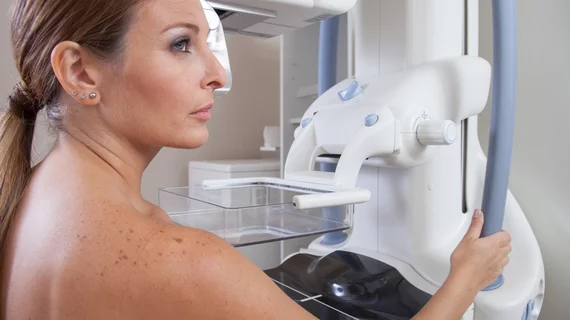'Surprising' decline in annual screening among breast cancer survivors has experts concerned
A drop in annual mammographic screening rates among breast cancer survivors has some experts questioning the barriers that might be preventing patients from seeking follow-up imaging.
In the April issue of the Journal of the National Comprehensive Cancer Network, researchers disclose that annual screening rates declined by 1.5% per year from 2009-2016. These declines were even more pronounced in survivors ages 40-49, for whom the rates dropped by 2.8% per year during that time.
“I was surprised that we saw declines in mammography use among patients who were continuing to see their cancer specialists. It suggests we are seeing less frequent mammography participation even among those who are otherwise engaged in their cancer care,” said lead researcher Kathryn P. Lowry, MD, assistant professor of radiology at the University of Washington School of Medicine in Seattle.
Lowry explained that although most women do well after completing breast cancer treatments, some will experience recurrence or go on to develop new cancer. Annual mammographic screenings can detect any recurrences or new cancers in the early stages of development, making treatment options and outcomes more favorable.
Using a nationwide commercial and Medicare Advantage claims database, researchers retrospectively analyzed the annual mammography screening rates among cancer survivors that took place between 2004 and 2016. This resulted in a cohort of 141,672 women ages 40 to 64 years who had a personal history of breast cancer.
From 2004 to 2009, the annual screening utilization rate among survivors held steady at around 74%. However, these rates dropped to around 67% between 2009 and 2016. Compared to women ages 50-64, the 40-49 age group decreased at a rate twofold higher. By 2016, researchers observed an annual screening rate of just 57.1% in the 40-49 age group.
“This important study highlights the critical role of longitudinal tracking of breast cancer survivors, including mammographic screening. In today’s systems and informatics-based records, we are not strategically prioritizing and reaching out to survivors using standardized and highly reliable processes,” said Amy M. Sitapati, MD, UC San Diego Moores Cancer Center and member of the NCCN Clinical Practice Guidelines in Oncology Panel for Breast Cancer. “The downward trend in adherence to annual mammography in survivorship should serve as a call to action for new processes that identify and engage breast cancer survivors.”
Sitapati, who was not involved in the study, suggested that qualitative interviews should be included in further research to better define the barriers to care that women may be facing. This is especially important, the researchers suggested, because these numbers were derived from pre-COVID data. Since many cancer screenings were delayed due to the pandemic, the screening decline observed in the study is likely even more cause for concern now.
More on breast imaging:
Mayo Clinic offers new guidance on supplemental screening of women with dense breasts
New data on false positive rates for DBT and DM screenings
Breast density notifications leave many women in the dark, survey results suggest
Combining neural network with breast density measurements boosts interval cancer detection rates
Mammograms should not be delayed after COVID vaccine, research shows

